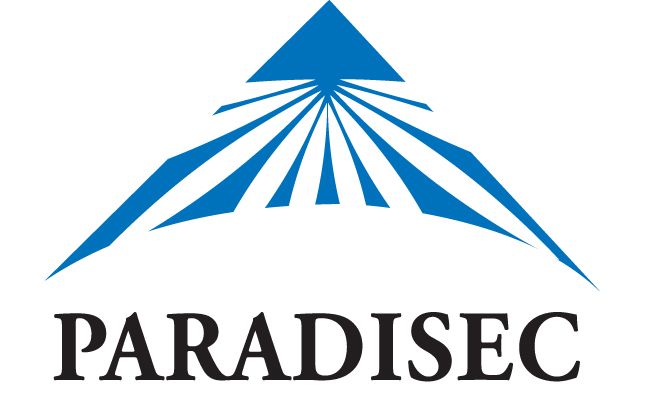
PARADISEC
PARADISEC (the Pacific And Regional Archive for Digital Sources in Endangered Cultures) is a digital archive of records of some of the many small cultures and languages of the world. Our research group has developed models to ensure that the archive can provide access to interested communities, and conforms with emerging international standards for digital archiving.
We have established a framework for accessioning, cataloguing and digitising audio, text and visual material, and preserving digital copies. A primary goal is to safely preserve material that would otherwise be lost. In this way we can make field recordings available to the people and communities recorded, and to their descendants.
We have distributed copies of recordings to the Vanuatu Cultural Centre, the University of New Caledonia, the Institute of Papua New Guinea Studies, the Solomon Islands National Museum and to Rapa Nui.
Australia lies within a region of great linguistic and cultural diversity. Over 2000 of the world’s 6000 different languages are spoken in Australia, the South Pacific Islands (including around 900 languages in New Guinea alone) and Southeast Asia. Within the next century this number is likely to drop to a few hundred. The majority of these 2000 languages and their associated cultural expressions (such as music and dance) are very poorly documented. Even in those languages that have begun to be documented many of the most developed cultural expressions (such as languages of song and ritual) have never been studied.
Australian researchers have been making unique and irreplaceable audiovisual recordings in the region since portable field recorders became available in the mid-twentieth century, yet until the establishment of PARADISEC there was no Australian repository for these invaluable research recordings.
PARADISEC is a consortium of three universities: the Universities of Sydney, the University of Melbourne, and the Australian National University. Operational functions are distributed across the participating campuses.
PARADISEC is directed by a Steering Committee of representatives from these three universities, with Dr Nick Thieberger as the PARADISEC Director, and Prof Linda Barwick as the Sydney Director.
At the University of Sydney PARADISEC is hosted by the Sydney Conservatorium of Music, our University of Melbourne base is in the School of Languages and Linguistics, and at the Australian National University PARADISEC is hosted by the ANU College of Asia and the Pacific.
Our distributed project operations have been made possible by the high bandwidth dedicated research and education network AARNet and the data storage facility of the Research Data Storage Infrastructure. We archive our audio data to international standards and formats for digital preservation using the Dobbin Audio Archiving system.
Our information leaflet is available to download in English, French, Simplified Chinese, Bahasa Indonesian, Tok Pisin, Japanese and Bislama.
Our repository hosts curated collections from researchers covering a number of different research areas, including linguistics, musicology and ethnomusicology, anthropology, oral history and associated research disciplines.
PARADISEC has collections representing over 1,000 languages. The PARADISEC online catalog is available at http://catalog.paradisec.org.au/. PARADISEC’s catalog can also be searched freely with unrestricted access via the OLAC or the LINGUIST LIST gateway.
Since 2003 PARADISEC has been funded by its participating Universities, along with occasional grants from the Australian Research Council (ARC) Linkage Infrastructure Equipment and Facilities (LIEF) program. Various other grants have allowed us to develop particular collections or technical capabilities. From 2015-2021 PARADISEC is the official archive partner of the ARC Centre of Excellence for the Dynamics of Language.
Director:
Dr Nick Thieberger
thien @ unimelb.edu.au
Sydney Unit:
Room 3019, Level 3
Sydney Conservatorium of Music C41
The University of Sydney NSW 2006
E: admin @ paradisec.org.au
T: 02 9351 1279
W: http://paradisec.org.au
Data in the PARADISEC collection should be cited at the item level using format given in our catalog’s ‘Cite as’ field, and we also include digital object identifiers (doi).
